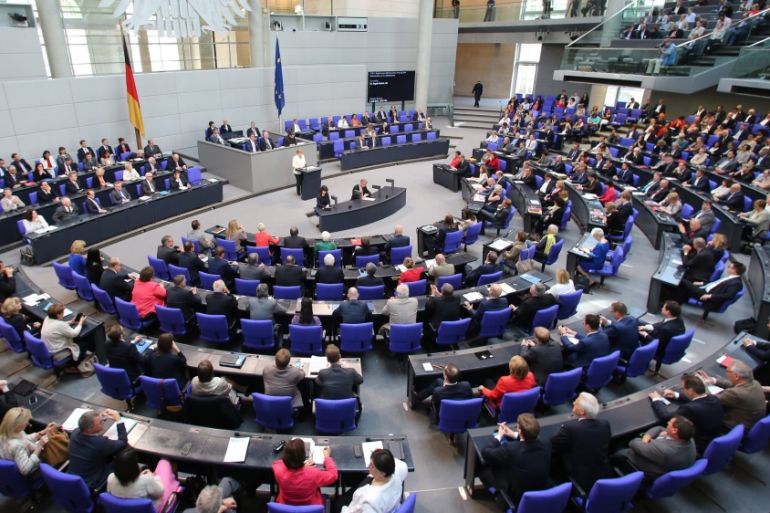German parliament adopts tougher rape law
“No means No” legislation classifies groping as sex crime, makes it easier to report rape and deport foreign offenders.

The German parliament has passed a new law by unanimous vote broadening the definition of sex crimes to cover cases in which a victim withheld consent but did not physically fight back.
Currently, victims reporting a rape to police must not only demonstrate that they verbally declined sex but also that they physically resisted their assailant.
Keep reading
list of 4 itemsGerman far-right politician on trial for alleged use of banned Nazi slogan
It is time for a democratic world order
Armourer for the film Rust sentenced to 18 months in fatal on-set shooting
The new legislation, dubbed the “No means No law”, will cover “the actual situations in which most attacks occur”, Justice Minister Heiko Maas said.
These include cases in which the victim is taken by surprise, intimidated or threatened with other violence, for example in an abusive relationship.
“It is crucial that we finally embed the principle ‘No means No’ in criminal law and make every non-consensual sexual act a punishable offence,” Eva Hoegl, a Social Democrats MP and one of the law’s sponsors, told the AFP news agency.
Tougher laws
The new legislation, which was adopted on Thursday, also classifies groping as a sex crime punishable by a two-year prison term or a fine.
It also lowers the bar for deporting foreign nationals who commit sexual offences.
The conservative parliamentary group included a stipulation making it illegal to be part of a group committing assaults in a crowd – rather than requiring proof that a specific person attacked a victim.
Anyone “who at least tacitly accepts that crimes are committed by a group they are a part of” can now be prosecuted.
READ MORE: Germany weighs deportations after sexual assaults
The latest reform drive began in 2011 with the passage of a Council of Europe convention on preventing and fighting violence against women, requiring signatories including Germany to penalise all “non-consensual” sexual acts.
German Chancellor Angela Merkel’s cabinet signed off on the measure in March after the attacks in Cologne, where more than 1,000 women reported sexual assaults and robberies on New Year’s Eve.
The alleged attacks were largely blamed on “foreigners” and heightened tensions over Germany’s migrant influx.
In January, Merkel proposed tougher laws, which include expelling asylum seekers convicted of committing crimes in Germany, in response to the assaults.
The German DPA news agency cited figures that 8,000 rapes were reported in Germany each year but that only one in 10 victims filed charges. Moreover, only one in 10 rape complaints led to a conviction.